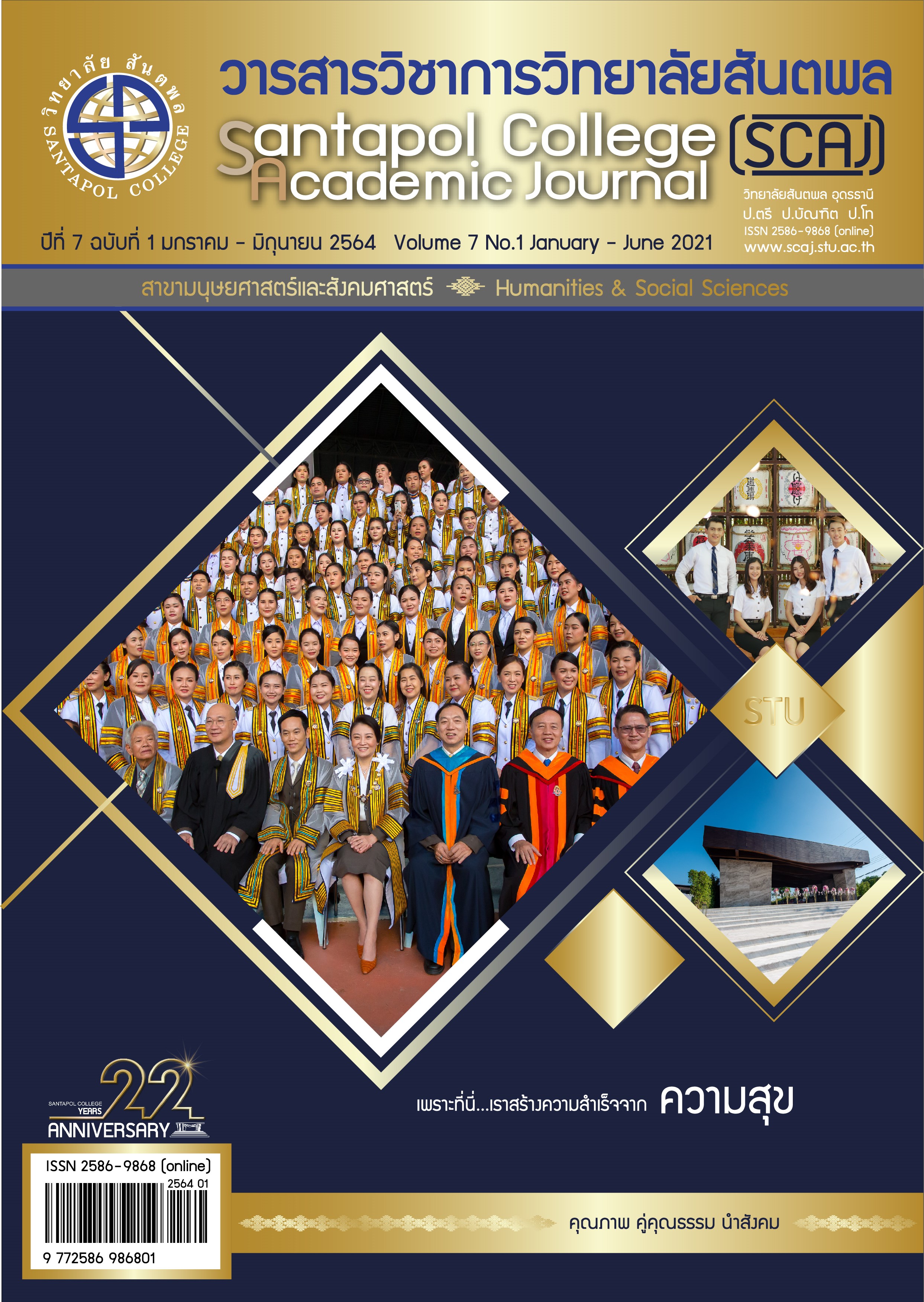การบริหารสถานศึกษาตามหลักปรัชญาเศรษฐกิจพอเพียงของโรงเรียนแกนนำสังกัดสำนักงานเขตพื้นที่การศึกษาประถมศึกษายะลา เขต 3
Main Article Content
บทคัดย่อ
บทคัดย่อ
การศึกษาครั้งนี้ มีวัตถุประสงค์เพื่อศึกษาและเปรียบเทียบการบริหารสถานศึกษาตามหลักปรัชญาเศรษฐกิจพอเพียงของโรงเรียนแกนนำสังกัดสำนักงานเขตพื้นที่การศึกษาประถมศึกษายะลา เขต 3 โดยจำแนกตามตำแหน่งประสบการณ์การทำงาน และขนาดของสถานศึกษาตลอดจนรวบรวมข้อเสนอแนะ กลุ่มตัวอย่าง ประกอบด้วยข้าราชการครู พนักงานราชการครู จำนวน 12 โรง กำหนดขนาดกลุ่มตัวอย่างโดยใช้ตารางกำหนดขนาดกลุ่มตัวอย่าง ของเครซี่ และมอร์แกน (Krejcie & Mogan 1970 : 608) ใช้การสุ่มแบบแบ่งชั้น (Stratified Random Sampling) ตามขนาดของโรงเรียน กลุ่มตัวอย่างที่ได้ แบ่งเป็น ข้าราชการครู จำนวน 113 คน และพนักงานราชการ จำนวน 44 คน เครื่องมือที่ใช้ในการวิจัยครั้งนี้เป็นแบบสอบถาม แบ่งออกเป็น 3 ตอน วิเคราะห์ข้อมูลโดยใช้สถิติจำนวน และร้อยละ ค่าเฉลี่ย และส่วนเบี่ยงเบนมาตรฐาน ผลการศึกษาพบว่า 1) ผลการศึกษาเกี่ยวกับค่าเฉลี่ยและค่าเบี่ยงเบนมาตรฐานของระดับการบริหารโรงเรียนตามหลักการใช้ปรัชญาเศรษฐกิจพอเพียงของโรงเรียนแกนนำสังกัดสำนักงานเขตพื้นที่การศึกษาประถมศึกษายะลา เขต 3 โดยภาพรวมอยู่ในระดับปานกลาง 2) ผลการเปรียบเทียบการบริหารสถานศึกษาตามหลักปรัชญาเศรษฐกิจพอเพียงของโรงเรียนแกนนำ สังกัดสำนักงานเขตพื้นที่การศึกษาประถมศึกษายะลา เขต 3 จำแนกตำแหน่ง ประสบการณ์ทำงาน และขนาดสถานศึกษา ภาพรวมไม่แตกต่างกัน 3) ข้อเสนอแนะเกี่ยวกับการบริหารสถานศึกษาตามหลักปรัชญาเศรษฐกิจพอเพียงของโรงเรียนแกนนำ สังกัดสำนักงานเขตพื้นที่การศึกษาประถมศึกษายะลา เขต 3 พบว่า ควรวางแผนการใช้จ่ายงบประมาณอย่างรอบคอบทุกด้าน รับฟังความคิดเห็นของเพื่อนร่วมงาน บริหารจัดการสถานศึกษาโดย คำนึงถึงความต้องการของชุมชนและนักเรียนเป็นหลัก ศึกษาบุคคลอื่นและเข้าใจชุมชนอย่างลึกซึ้ง และให้โอกาสให้ผู้อื่นในการปฏิบัติงานเสมอ เป็นต้น
Article Details

อนุญาตภายใต้เงื่อนไข Creative Commons Attribution-NonCommercial-NoDerivatives 4.0 International License.
เนื้อหาและข้อมูลในบทความที่ลงตีพิมพ์ในวารสารวิชาการวิทยาลัยสันตพล ถือว่าเป็นข้อคิดเห็นและความรับผิดชอบของผู้เขียนบทความโดยตรง ซึ่งกองบรรณาธิการวารสารไม่จำเป็นต้องเห็นด้วยหรือรับผิดชอบใดๆ
เอกสารอ้างอิง
กระทรวงศึกษา. (2554). คู่มือการประเมินสถานศึกษาพอเพียงตามหลักปรัชญาของเศรษฐกิจพอเพียงกรุงเทพ.กระทรวงศึกษาธิการ
เถาวัลย์ รองทอง. (2552). ประสิทธิผลการบริหารโรงเรียนตามหลักปรัชญาของเศรษฐกิจพอเพียงในโรงเรียนสังกัดสำนักงานเขตพื้นที่การศึกษาสกลนคร เขต 3. วิทยานิพนธ์ครุศาสตรมหาบัณฑิต. สาขาการบริหารการศึกษา. มหาวิทยาลัยราชภัฏสกลนคร.
ธนธรรม มีทอง. (2552). การบริหารจัดการสถานศึกษาตามแนวคิดเศรษฐกิจพอเพียง : กรณึศึกษาโรงเรียนบ้านร่องแซง. รายงานการศึกษาอิสระปริญญาศึกษาศาสตรมหาบัณฑิต. สาขาวิชาการบริหารการศึกษา บัณฑิตวิทยาลัย. มหาวิทยาลัยขอนแก่น
เพ็ญนภา ธีรทองดี. (2552). การนำหลักปรัชญาเศรษฐกิจพอเพียงไปใช้บริหารจัดการของสถานศึกษา สังกัดสำนักงานเขตพื้นที่การศึกษาราชบุรี เขต 2. วิทยานิพนธ์ศึกษาศาสตร์มหาบัณฑิต. มหาวิทยาลัยราชภัฎหมู่บ้านจอมบึง.
รัชดา ทองสุข. (2552). การรับรู้การบริหารจัดการสถานศึกษาตามหลักปรัชญาเศรษฐกิจพอเพียงของผู้บริหารสถานศึกษาสังกัดสำนักงานเขตพื้นที่การศึกษาประถมศึกษาพระนครสรีอยุธยา เขต 1 และเขต 2. วิทยานิพนธ์ครุศาสตรบัณฑิต.สาขาวิชาการบริหารการศึกษา. มหาวิทยาลัยราชภัฏพระนครศรีอยุธยา.
วรเดช จันทรศร และคณะ. (2551). การศึกษาวิจัยเพื่อขยายการพัฒนาสู่สาธารณะด้านแหล่งน้ำ ดิน ป่า และการเกษตรตามหลักปรัชญาเศรษฐกิจพอพียง. กรุงเทพฯ : สหายบล็อกและการพิมพ์.
สำนักงานคณะกรรมการการพัฒนาการเศรษฐกิจและสังคมแห่งชาติ. (2554). แผนพัฒนาพัฒนาการเศรษฐกิจและสังคมแห่งชาติฉบับที่ 111 (พ.ศ. 2555 - 2559). กรุงเทพฯ. สำนักนายกรัฐมนตรี.


